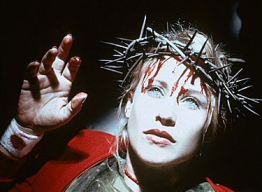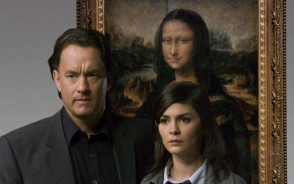
March 25, 2008
Why Catholic-Bashing Should Concern All Christians
In the recent DVD release, Elizabeth: The Golden Age, the historical conflict between Catholics and Protestants takes center stage. The Protestant Queen Elizabeth I is threatened and undermined by the Catholic King Phillip II of Spain. The Catholics in the film are nearly all blind zealots looking to undo the more rational Queen. The Queen herself is presented not as a figure of any notable Protestant belief, but more as a stalwart secularist protecting her homeland from its mystic foes. The film is not a balanced view of this important time in European history, but rather a half-baked diatribe against religion in general.
Filmmakers casually giving the Catholic Church a swift kick in the shorts isn’t a new phenomena. There have been a few films that take swipes at the church like: Stigmata, The Da Vinci Code, The Order, Priest, Constantine, Jeffrey, Hudson Hawk, Dogma, Saving Silverman, The Golden Compass, The Name of the Rose, Primal Fear, The Pope Must Die, Hail Mary, The Devils, The Magdalene Sisters, Chocolat, The Agnes of God, The Boys of St. Vincent, Mystic River, Casanova…It goes on from there. Add your titles to the list.
There have been a few films that take swipes at the church like: Stigmata, The Da Vinci Code, The Order, Priest, Constantine, Jeffrey, Hudson Hawk, Dogma, Saving Silverman, The Golden Compass, The Name of the Rose, Primal Fear, The Pope Must Die, Hail Mary, The Devils, The Magdalene Sisters, Chocolat, The Agnes of God, The Boys of St. Vincent, Mystic River, Casanova…It goes on from there. Add your titles to the list.
Why is the Catholic Church so often the focus of attention rather than other Christians? First because the Church has a broad, international reach, and it has a deep influence on every culture it touches. The impact of the church as a worldwide organization is undeniable. This wide reach didn’t happen overnight. The Church has a long history that goes back to Biblical times. You cannot tell the story of mankind without talking a great deal about the workings of the Church. It is the backbone of the Christian faith.
Another reason Catholicism is so readily used as the entertainment industry’s personal diaper is because Catholics are so dang easy to spot. Priests, nuns, cardinals and Popes all wear easily identifiable uniforms. No one has ever said, "Hey, I was down at Chuck E. Cheese and thought I saw the Pope, it turned out it was Jerry." Even if Jerry likes to wander around with a large bejeweled hat, the Pope is the Pope. Think of it, if you’re a filmmaker and have a point to make about Christianity, what do you do? How do you readily show a Baptist preacher? You'd have to show a guy with big hair and a bad sweater. Even if you do this, you'll still have to point out he’s a Christian and not just some poorly dressed guy with a lot of opinions. For the sake of economy, it would be easier to just slap a collar on the guy and give him an Irish last name.
When filmmakers take shots at Christians in general it always causes an uproar. When the target of the insult is Catholic, the cries of foul often are quieter. Sure, with groups like The Catholic League and the well organized online bloggers few insults go unanswered. For non-Catholics the attacks are usually treated as someone else's problem. If a Christian sees a cheap shot at a priest or a story centering on the Church's misdeeds (both imagined and real) and that Christian isn't troubled, there's a problem. The truth be told, all Christians should react strongly when any of our brothers and sisters - even those we disagree with - are maligned. The fact is that when filmmakers attack the Catholic faith more times than not their real intent is to attack ALL Christians from Catholic, to Lutheran and Baptist to everyone in between. Religion in general is the target, not just one branch of it. If you look at films that specifically focus on the Catholic faith such as Elizabeth: The Golden Age, or The Golden Compass study what they are really saying. They're usually not just attacking the Catholic religion, they're attacking all religion. The following of Christ is the issue. If one can injure Christians and dismantle our collective faith, the vacuum that is created can be filled with a secular belief system. When actor Ian McKellen stated on the Today show “I've often thought the Bible should have a disclaimer in the front saying this is fiction.” he speaks for a large number of people in the entertainment industry. Should it come as any surprise that McKellen, a proud hater of the Christian faith, has had ample opportunity to star in a number of films that are openly hostile to God (The Da Vinci Code, The Golden Compass, For the Love of God)? Those who loathe Christ and his teachings have a voice and they use it freely with the support of the film industry. Do not fool yourself, those willing to tear the Catholic Church down do not usually trouble themselves with the distinction in theology between the Pope and Billy Graham. When they throw these cinematic eggs at the Vatican they are meant to splatter on us all.
ALL Christians from Catholic, to Lutheran and Baptist to everyone in between. Religion in general is the target, not just one branch of it. If you look at films that specifically focus on the Catholic faith such as Elizabeth: The Golden Age, or The Golden Compass study what they are really saying. They're usually not just attacking the Catholic religion, they're attacking all religion. The following of Christ is the issue. If one can injure Christians and dismantle our collective faith, the vacuum that is created can be filled with a secular belief system. When actor Ian McKellen stated on the Today show “I've often thought the Bible should have a disclaimer in the front saying this is fiction.” he speaks for a large number of people in the entertainment industry. Should it come as any surprise that McKellen, a proud hater of the Christian faith, has had ample opportunity to star in a number of films that are openly hostile to God (The Da Vinci Code, The Golden Compass, For the Love of God)? Those who loathe Christ and his teachings have a voice and they use it freely with the support of the film industry. Do not fool yourself, those willing to tear the Catholic Church down do not usually trouble themselves with the distinction in theology between the Pope and Billy Graham. When they throw these cinematic eggs at the Vatican they are meant to splatter on us all.
Filmmakers casually giving the Catholic Church a swift kick in the shorts isn’t a new phenomena.
 There have been a few films that take swipes at the church like: Stigmata, The Da Vinci Code, The Order, Priest, Constantine, Jeffrey, Hudson Hawk, Dogma, Saving Silverman, The Golden Compass, The Name of the Rose, Primal Fear, The Pope Must Die, Hail Mary, The Devils, The Magdalene Sisters, Chocolat, The Agnes of God, The Boys of St. Vincent, Mystic River, Casanova…It goes on from there. Add your titles to the list.
There have been a few films that take swipes at the church like: Stigmata, The Da Vinci Code, The Order, Priest, Constantine, Jeffrey, Hudson Hawk, Dogma, Saving Silverman, The Golden Compass, The Name of the Rose, Primal Fear, The Pope Must Die, Hail Mary, The Devils, The Magdalene Sisters, Chocolat, The Agnes of God, The Boys of St. Vincent, Mystic River, Casanova…It goes on from there. Add your titles to the list.Why is the Catholic Church so often the focus of attention rather than other Christians? First because the Church has a broad, international reach, and it has a deep influence on every culture it touches. The impact of the church as a worldwide organization is undeniable. This wide reach didn’t happen overnight. The Church has a long history that goes back to Biblical times. You cannot tell the story of mankind without talking a great deal about the workings of the Church. It is the backbone of the Christian faith.
Another reason Catholicism is so readily used as the entertainment industry’s personal diaper is because Catholics are so dang easy to spot. Priests, nuns, cardinals and Popes all wear easily identifiable uniforms. No one has ever said, "Hey, I was down at Chuck E. Cheese and thought I saw the Pope, it turned out it was Jerry." Even if Jerry likes to wander around with a large bejeweled hat, the Pope is the Pope. Think of it, if you’re a filmmaker and have a point to make about Christianity, what do you do? How do you readily show a Baptist preacher? You'd have to show a guy with big hair and a bad sweater. Even if you do this, you'll still have to point out he’s a Christian and not just some poorly dressed guy with a lot of opinions. For the sake of economy, it would be easier to just slap a collar on the guy and give him an Irish last name.
When filmmakers take shots at Christians in general it always causes an uproar. When the target of the insult is Catholic, the cries of foul often are quieter. Sure, with groups like The Catholic League and the well organized online bloggers few insults go unanswered. For non-Catholics the attacks are usually treated as someone else's problem. If a Christian sees a cheap shot at a priest or a story centering on the Church's misdeeds (both imagined and real) and that Christian isn't troubled, there's a problem. The truth be told, all Christians should react strongly when any of our brothers and sisters - even those we disagree with - are maligned. The fact is that when filmmakers attack the Catholic faith more times than not their real intent is to attack
 ALL Christians from Catholic, to Lutheran and Baptist to everyone in between. Religion in general is the target, not just one branch of it. If you look at films that specifically focus on the Catholic faith such as Elizabeth: The Golden Age, or The Golden Compass study what they are really saying. They're usually not just attacking the Catholic religion, they're attacking all religion. The following of Christ is the issue. If one can injure Christians and dismantle our collective faith, the vacuum that is created can be filled with a secular belief system. When actor Ian McKellen stated on the Today show “I've often thought the Bible should have a disclaimer in the front saying this is fiction.” he speaks for a large number of people in the entertainment industry. Should it come as any surprise that McKellen, a proud hater of the Christian faith, has had ample opportunity to star in a number of films that are openly hostile to God (The Da Vinci Code, The Golden Compass, For the Love of God)? Those who loathe Christ and his teachings have a voice and they use it freely with the support of the film industry. Do not fool yourself, those willing to tear the Catholic Church down do not usually trouble themselves with the distinction in theology between the Pope and Billy Graham. When they throw these cinematic eggs at the Vatican they are meant to splatter on us all.
ALL Christians from Catholic, to Lutheran and Baptist to everyone in between. Religion in general is the target, not just one branch of it. If you look at films that specifically focus on the Catholic faith such as Elizabeth: The Golden Age, or The Golden Compass study what they are really saying. They're usually not just attacking the Catholic religion, they're attacking all religion. The following of Christ is the issue. If one can injure Christians and dismantle our collective faith, the vacuum that is created can be filled with a secular belief system. When actor Ian McKellen stated on the Today show “I've often thought the Bible should have a disclaimer in the front saying this is fiction.” he speaks for a large number of people in the entertainment industry. Should it come as any surprise that McKellen, a proud hater of the Christian faith, has had ample opportunity to star in a number of films that are openly hostile to God (The Da Vinci Code, The Golden Compass, For the Love of God)? Those who loathe Christ and his teachings have a voice and they use it freely with the support of the film industry. Do not fool yourself, those willing to tear the Catholic Church down do not usually trouble themselves with the distinction in theology between the Pope and Billy Graham. When they throw these cinematic eggs at the Vatican they are meant to splatter on us all.Share
Previous Posts




Good News Film Reviews LLC 2004-2010 - used with permission
Images, video and titles are the property of their respective copyright holders. Good News Film Reviews LLC claims no ownership or connection to them.
The views expressed on this site are not the opinion of any advertiser or external entity.
While we take care to only link to responsible entities, Good News Film Reviews LLC takes no responsibility for the content linked from this site. There are sharks in the waters. Surf at your own risk.
The Template is generated via PsycHo and is Licensed.





















5 Comments:
True enough, though I would suggest we don't need to start conflating the authority claimed for the bishop of Rome among Latin Christians beginning in the 5th Century or so, and the subsequent emergence of what by the 9th Century was a "Catholic" church over against the other "Catholic" churches such as the Syrian (Nestorian) and eventually even itself (as the Eastern Orthodox actually date their Patriarchy to the same "Catholic" church and only differ with the Romans on who left who), not to mention the "Catholic" English church, which bases its claims on that marvelous Tudor re-invention of itself as "British" and heir to the British church of Apostolic vintage that the Anglo-Saxons massacred at the behest of the Roman legate in the 5th C. I mean, which of these is The Church, anyway?
There are good reasons to defend Christian history against the peculiar mythology of modernism, even when it has been copped from Protestant polemics (as it often has). At the same time, well, we don't need to sign on to a mythology of "Catholic" Christianity to do that.
I suggest we continue speaking of the churches, and not The Church, until Christ assembles the Body called out of all times and places at last. In the churches, we who are communicants of Christ are The Church each time we are together as His Body in our times and places.
Peace,
PGE
Every time I see you have left a comment I have to admit I can't wait to get to it.
Agree or disagree I look forward to what you have to say.
I agree with your view of "The Church". The use of the term "The Church" is a leftover from my Catholic upbringing - no offense meant. Please note that this is written as a non-Catholic. This said, I feel the continual trashing of the Catholics is a serious issue. I don't subscribe to their beliefs and have considerable issues with their teachings but knowing the intent of the attacks concerns me.
sure 'nuff. I enjoy reading your reviews, and it's been fun keeping up this very episodic conversation.
At more than one social function I've found myself back-to-back with a particularly conservative Catholic priest I know over our differences with our liberal Protestant (and even Catholic) colleagues. It is quite remarkable, actually.
One is constantly making baby/bathwater choices in such situations. :-)
Cheers,
PGE
As my simple mind works, I really have little problem with how Hollywood skewers the Roman Catholic church. It asks for it time and time again.
I also have little problem with them going after components of the Protestant wing when it comes to overactive political movements (Dobson, et. al).
Sure they produce grossly offensive material about Christianity, but that even occurs within the Christian realm itself.
With that being said, I think there's increasing awareness towards the vacuousness of Hollywood and how seriously people take it. I found plenty of articles about the recent lack of interest in the Oscars, which maybe indicates even the duped masses still have a little sanity left in them.
Scott, there are many valid criticisms of the movie Elizabeth. But taking offense at the negative depiction of Catholics in 16th century England isn't one of them.
They didn't call Elizabeth's sister "Bloody Mary" because of her fondness for vodka and tomato juice.
And the Spanish Inquisition under Mary's husband, King Philip II, was almost nothing like you may have seen depicted on television. I assure you that much sterner stuff was done to protestants than forcing them to sit in comfy chairs until lunchtime.
I agree that the gratuitious depiction of bad behavior by religous characters is often unecessary. But in Elizabeth, that bad behavior is reflected in the historical record. The movie is not trashing Catholics, and does not deserve your negative review on that basis.
Post a Comment
<< Home